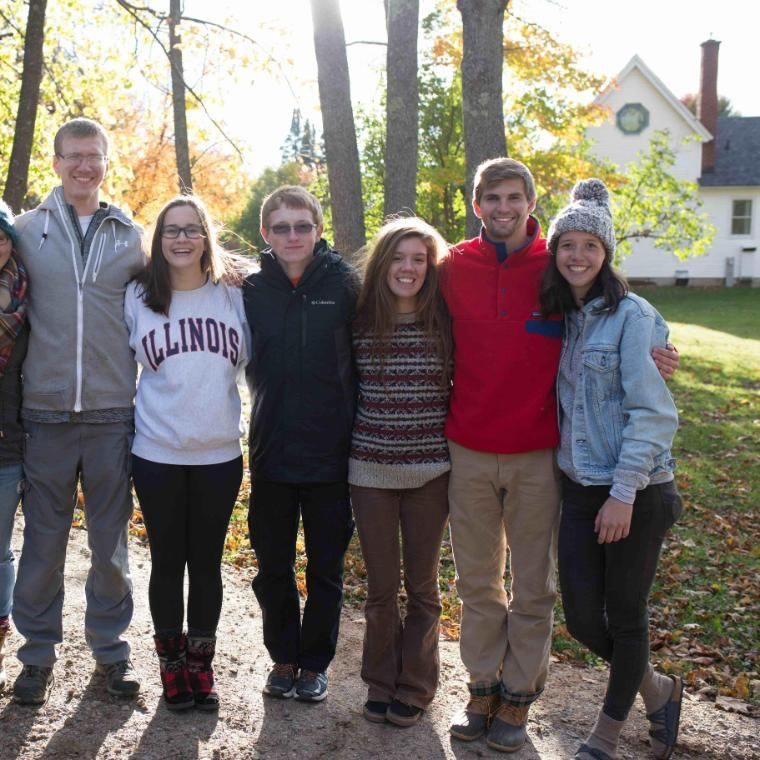Hear From Vanguards
The only Christian, Liberal Arts Gap Year Program.
What makes Vanguard unique? Why Vanguard?
Our liberal arts approach sets us apart from any other program. When looking at other gap years, you'll notice how they tend to build their year around a primary theme: community service, travel, work, or earning college credits. Don't get us wrong—these are all good things! That's why at Vanguard, we weave them together in an unparalleled experience that will launch Vanguards into college.
Vanguard students are some of the most curious young adults you'll find. They bring questions about faith, life, and their purpose to a place where questions become conversations and start to form a practiced Christian faith. Beyond curious, Vanguards are outdoorsy and faithful. They are ready for a healthy challenge and have a desire to grow. Whether they’re academically-apt or trade-minded, outdoor experts or entry-level hobbyists, questioning or firm in their faith, Vanguards are ambitious young adults. Our program helps them envision where they want to go and plan the route to get there.
At Wheaton College, we’ve created a Christ-centered, collaborative, and immersive environment for thinkers just like you to ask and explore big questions. Our program is structured in such a way as to help us better understand God’s truth, our purpose, and how we should live in light of the Great Commission.
Now you know what kind of people Vanguards are: They’re curious and introspective. They’re active learners, committed to self-discovery through immersion in diverse experiences. And above all—Vanguards carve their own path; our gap year opportunity simply gives Vanguards the tools for carving.
So let’s take a look at gap year options generally—and then Wheaton College’s option—so you and your family can make the best-informed decision.
Frequent Questions About Christian Gap Years
Benefits of a Christian Gap Year for Students:
The benefits of a gap year are always linked to why students decide to take a gap year, which we covered in the last question. To recap, students take a gap year for one or more of the following reasons: they need time and space to recharge before the academic pressure of college; to travel and explore new ways of thinking and living; to build up their Christian faith; to more fully consider their higher education options (major, institution, timeframe).
So, after recapping why high school students decide to take a gap year, here are some of the benefits:
- Taking time to self-assess and reflect on who you are and where you're headed
- Learning how to navigate life away from home before adding the stress and pressure of academics
- Exploring areas of study beyond what your high school offered
- Building soft skills like problem-solving, conflict resolution, teamwork, and
Benefits of a Christian Gap Year for Parents:
You'll see a more confident, mature, and focused individual who will walk into college with a purpose. They will have navigated life away from home and have found their footing before you make a significant investment in college.
According to the National Center for Education Studies, from 2011 to 2017, only 60% of students who began pursuing a bachelor's degree at a 4-year institution completed that degree (at the original institution) within 6 years. The National Student Clearinghouse Research Center shares a slightly smaller stat: 58% of students will complete a degree within 6 years.
Either way, 4 out of every 10 students who begin college will not complete their degree within 6 years.
That's where a gap year comes into play. Since students have taken time to figure out who they are and where they're going, they can approach college with more confidence, motivation, and purpose. Instead of transferring schools or switching majors three times before sophomore year, they have a good idea of what major will actually help prepare them for their future. Rather than struggling to balance their studies, social life, and sleep, they will have the self-awareness to set priorities, realize their limits, and allocate time accordingly.
From one of our Vanguards, Sarah Lambert:
During freshman year of college I just saw so many people spending 95% of their energy learning how to live away from home. Since I had already done that, I could focus on school.
When wisely chosen, a gap year will help your student build the self-awareness, skills, and mindset to approach college prepared (and excited!) to make a return on the investment.
Overall, the risks of taking a gap year are low. It's a 3-12 month commitment. There are a variety of price options—there are even options where you make money. With that being said, we've outlined a few things to consider:
For a Gap Year Student:
- Foregoing or having to reapply for college scholarships
- Delaying the start of college/career
- Facing others who might believe you're "not ready" for college or not "smart enough" for college
For a Gap Year Parents:
- Paying for an additional experience on top of college
- Risk of your student not returning to college - yet in a 2015 study by the Gap Year Association, 90% of gappers returned to college in the year following their gap experience
Taking a purposeful gap year does not negatively impact your chances of admission into college. Higher education institutions see a gap year as giving students time to mature, explore their interests, and build life experience. Instead of admitting a student who will be learning how to navigate life away from home for the first time while managing a full course load, an Admissions Counselor would see an adjusted, independent, and motivated applicant.
Vanguard is built to help students grow in confidence, maturity, and focus. We give Vanguards the tools to clearly articulate their experience in college applications and interviews, which improves their admissions chances.
Occasionally a gap year can impact your financial aid and scholarship offerings:
- If you're given a scholarship that cannot be deferred, you must decide whether to accept the scholarship and attend the institution or reject the scholarship for a gap year experience.
- If you take a gap year that offers college credit, make sure to understand whether you'd be considered a first-year student or a transfer at your colleges of choice. Furthermore, read the fine print about financial aid and scholarship offerings. Sometimes financial aid and scholarships are tied to your academic standing. Earning too much credit in a gap year could bump you into a "transfer" status, which can impact finances.
We firmly believe a gap year can benefit any student who’s curious and ready for a healthy challenge. However, we've also provided a few questions below to help you consider whether a gap year is a needed path for you.
- Is there excitement about the college options and/or selection? The major?
- Is there a feeling of academic burnout?
- Is there the responsibility, maturity, and judgment needed to make a solid return on the college investment?
- Is there an intrinsic desire to grow in their faith?
- Is there solid support system of both peers and mentors to walk with them through the ups and downs of college and life?
- Will faith flourish outside of their home environment?
Information About Vanguard Gap Year
That's a great question! We've done our best to wrangle the year into a simple "at a glance" grid. Then, we took it a step farther and created an average week/day in the life. Use the links below to check it out.
Whether you've recently graduated from high school or are a year or two into college, we welcome your application! Generally, Vanguards are 17-20 years old. Most are recent high school graduates, but every year we have one or two students who spent a semester or two at college.
We realize a gap year is often an unanticipated "extra" in the higher education decision. Finding affordable gap year programs is at the top of most people's list—if this is you, you're not alone!
Any student can get the cost of Vanguard down to $11,000 through fundraising, a matching scholarship, and working at HoneyRock during the summer immediately following their gap year. The cost of the program covers room and board, 8 transferrable college credits, and all program trips and activities.
If the opportunities to decrease the cost of Vanguard aren't taken advantage of, the cost of the program is $18,300.
Applications to Vanguard are accepted on a rolling basis. If your application is completed before April 1, your decision deadline is May 1. If you apply after April 1 and are accepted to Vanguard, you will have one month to accept your offer and pay the deposit.
If you were invited to interview for Vanguard from Wheaton's waitlist, you will have one month from the time you receive confirmation of admission to accept your offer and pay the deposit.
About 30% of Vanguards continue to Wheaton College and complete their studies in four years. Nearly 40% of our alumni continue to on to a variety of higher education institutions—private, public, Christian, secular. It's a mix! The remaining 10% decide that entering the workforce and/or attending a community college is the best route for them.
Ultimately, we're helping students discover their purpose and find the best fit next step. For some, it's Wheaton College. For other students, it's another school or path altogether. While our ideal students are set on or seriously considering college, some find that it's not the right fit.
We don’t shy away from questions, and we don’t have pre-developed answers. Previous Vanguards have entered the year asking questions like, “What do I really believe?” and “Who do I want to be?” Our immersion gap year program stimulates such reflection.
What if you don’t ask those questions, though? That’s okay; Vanguard is still the experience for you. Based on the historic church calendar, we've crafted questions that guide conversations, seminars, and reflection during the year. Check them out below:
| Liturgical Season | Seminar |
|---|---|
| Ordinary Time | Why does God matter? |
| Advent | What does it mean to be human? |
| Christmas | Who and what is the church? |
| Epiphany | What is truth? |
| Lent | How do we respond to evil and injustice in the world? |
| Easter & Pentecost | What is my purpose in light of the Great Commission? |
We’ve developed five milestones that mark significant conversations in what we call our vocational discernment process. This process informs every part of our college’s gap year program.
- The Sacredness of Work—We start by reframing commonly held beliefs about work and vocation.
- Understanding Self—What does it mean to be uniquely created by God and rooted in Christ? Vanguards examine their strengths, limits, personal values, weaknesses, challenges, and passions to gain a better picture of who they are.
- Understanding the World We Live In—We have to understand the challenges and struggles of the world we live in and how we can use our gifts, passions, and talents to build the kingdom of God here on earth.
- Practicing in the Present—Vocation isn’t just a future thing—it’s in the here and now. Vanguards explore how they can live out their vocational callings in the present.
- Making Choices—You can’t just think about the future. Discovering and living out your vocation means making decisions and choosing a path. It doesn’t have to be filled with anxiety. . .your decisions can be freeing!

This is the single-most impactful part of the Vanguard Gap Year.
- "I grew up a lot during Vanguard, I grew into a faith and a way of being in relationships with people that has entirely changed who I am." - Katherine '17
- "I think a huge outcome for me was a greater understanding of relationships - a lot of growth in relational maturity. It helped a lot with an awareness of self, an awareness of others, and how I can resolve conflict." - Morgan '17
- "I didn't expect everyone to get so close so quickly, which was really cool. I learned how to live in a close-knit community, solve problems, and build close relationships." - Duncan '18



